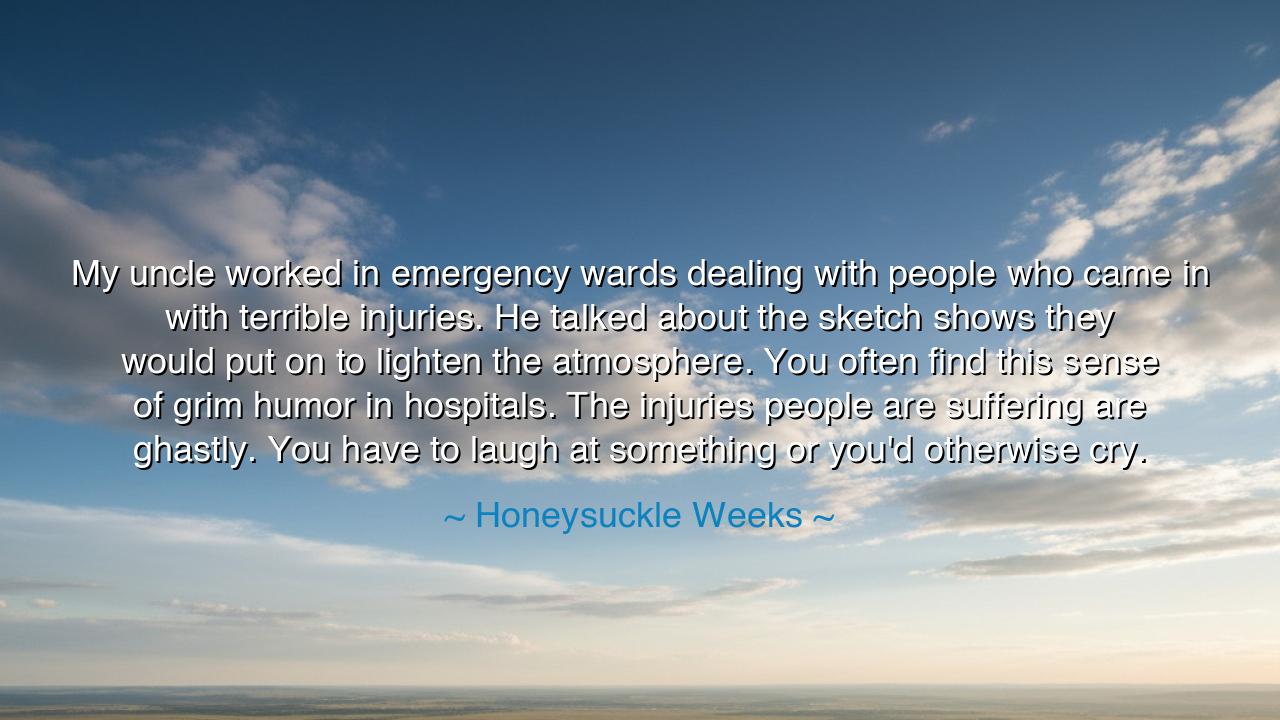
My uncle worked in emergency wards dealing with people who came
My uncle worked in emergency wards dealing with people who came in with terrible injuries. He talked about the sketch shows they would put on to lighten the atmosphere. You often find this sense of grim humor in hospitals. The injuries people are suffering are ghastly. You have to laugh at something or you'd otherwise cry.






In the journey through life, where pain and suffering are inevitable companions, there comes a time when the human spirit must find a way to endure even the most harrowing of circumstances. Honeysuckle Weeks, in her poignant reflection on her uncle’s work in the emergency wards, shares a profound truth about the resilience of the human soul. She says, "My uncle worked in emergency wards dealing with people who came in with terrible injuries. He talked about the sketch shows they would put on to lighten the atmosphere. You often find this sense of grim humor in hospitals. The injuries people are suffering are ghastly. You have to laugh at something or you'd otherwise cry." In these words, Weeks reveals the age-old understanding that laughter, even in the face of tragedy, can be a lifeline, a way to confront the darkness of the world without losing ourselves to it.
In the ancient world, where warriors and philosophers alike faced the brutal realities of life, there was a deep understanding of the need for humor in the face of adversity. Consider the great Homeric heroes—heroes like Achilles and Odysseus—whose stories were filled with moments of great suffering, yet were also punctuated by wit, irony, and humor. Even in the deepest moments of grief, Achilles found laughter amidst the carnage, for he understood that humor was not a denial of suffering, but a way of asserting life’s strength in the face of it. Like these ancient figures, Weeks' uncle and the medical staff who worked alongside him understood that in the most tragic of moments, humor became a means of survival. It was not a dismissal of the horrors they witnessed, but a tool to bear the weight of it.
The ancients also understood that grief and joy were often inseparable. In ancient Greece, the tragedy of the theater was often accompanied by comedy, reminding the audience that life is a delicate balance of light and dark. Just as the great playwright Aristophanes blended satire with solemn themes, Weeks’ uncle used humor to soften the severity of the pain surrounding him. Grim humor, as she calls it, is not merely a coping mechanism—it is a recognition that the human soul is capable of both profound sorrow and resilient strength. In those moments when the physical suffering of others seems unbearable, it is often humor that allows us to continue, to rise above the weight of the world without succumbing to despair.
Consider, too, the story of Victor Frankl, the renowned psychiatrist and Holocaust survivor, who found that even in the most extreme suffering of the concentration camps, humor became a means of resistance. In his memoir Man’s Search for Meaning, Frankl wrote about how those who could laugh, even in the midst of horrific suffering, were more likely to survive. They were not escaping the reality of their situation, but rather facing it with a mindset that refused to be defeated. Frankl's own use of humor, even in the darkest hours, allowed him to see beyond the immediate suffering, and in doing so, he found a deeper meaning in the human experience. In the same way, Weeks’ uncle and his colleagues found meaning in their work by turning to humor, not to minimize the pain, but to transform it.
The power of humor in the face of suffering is not limited to personal resilience but extends to the community as well. Hospitals, as Weeks notes, are places where human pain is often laid bare, but also places where the spirit of connection among those who suffer and those who care for them is most vital. Humor, in this context, becomes the bridge that connects people—patients, doctors, and caregivers alike—helping them to see beyond the fear and hopelessness of their immediate circumstances. It is a way to say, "We are in this together," to share not only the burden of suffering but also the relief that comes from shared laughter. The ancient tribes and warriors knew that in times of strife, the bond of laughter made the hardest challenges bearable.
And so, the lesson Weeks imparts is one that transcends time and place: that humor, especially in the darkest of times, is a gift of the human spirit. It is not a denial of suffering, but a defiance of its ability to break us. Grim humor, as it is often called, becomes a shield, a way to endure the unbearable and to maintain our humanity amidst the cruelty of the world. Like the warriors of old, like Frankl in the camps, and like Weeks’ uncle in the emergency room, we too must find ways to laugh in the face of life’s tragedies. For in humor, we not only survive; we find the strength to thrive, to continue walking, side by side, with those who share our burdens.
In our own lives, let us take this wisdom to heart. When faced with adversity, let us not shy away from the darkness, but embrace the humor that allows us to look it squarely in the face. Let us remember the power of laughter to heal, to connect, and to transform the hardest moments into opportunities for growth and resilience. For it is through humor, in all its forms, that we truly find the strength to move forward, to keep walking even when the path ahead is shrouded in shadows. Through laughter, we claim our humanity, and in doing so, we discover the light that resides within us all.






AAdministratorAdministrator
Welcome, honored guests. Please leave a comment, we will respond soon